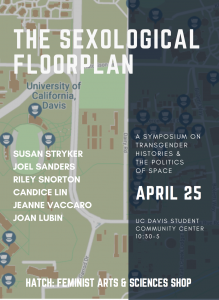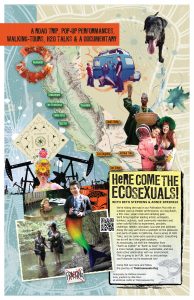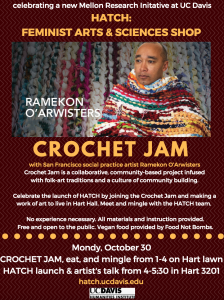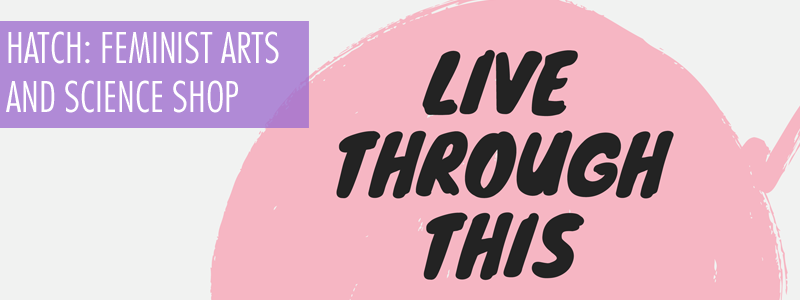Curriculum: makers & scholars in dialogue
Curriculum is a curated event series that brings together artists, makers, and scholars whose work is experimental in form. Curriculum is an inquiry of discipline (what processes and practices do participants engage?) and disciplines (where in the university does their work live and resonate?).
Fall 2018
So Sick: A Conversation with author Porochista Khakpour and filmmaker Sini Anderson
(is lyme disease a feminist issue? on chronic illness and healthcare in a climate crisis)
Tuesday, November 13 | 4:00-6:00 pm | Hart 3201
Previously on HATCH: Spring 2018
The Sexological Floorplan: Susan Stryker, Joel Sanders, Riley Snorton, Candice Lin, Joan Lubin, and Jeanne Vaccaro
Wednesday, April 25 from 10:30-5 at the UC Davis Student Community Center
Although optional, it is helpful if you register!

The Sexological Floorplan is a symposium exploring transgender histories and the politics of space. Across three collaborative duets theorizing the administration of sex, race, and dis/ability, The Sexological Floorplan excavates ancillary, adjacent, and minor spaces in underthought proximity to the bureaucratization of social life. Spanning the 19th century to our contemporary moment, the scholar-artist-activists assembled consider the gynecological curtain, the sexological waiting room, and the public toilet. For details read more.
Winter 2018
Here Come the Ecosexuals: Annie Sprinkle and Beth Stephens screen experimental documentary Water Makes Us Wet
Thursday, February 1 at noon in Hart 3201

Beth Stephens & Annie Sprinkle live and work together in Boulder Creeks’s coastal redwood forest and in an old Victorian cottage in San Francisco. Devoted to developing the ecosex movement through art, theory, practice and activism since 2004, they’ve produced numerous ecosex symposiums, ecosex weddings, workshops, lectures, walking tours, and art exhibits. Their award winning documentary, Goodbye Gauley Mountain: An Ecosexual Love Story has played in numerous film festivals. Beth is an Art Professor at UC Santa Cruz, Annie has a Ph.D. in Human Sexuality.
Fall 2017
Reading by poet Renee Gladman on Prose Architectures & dialogue with Rachel Levitsky
Tuesday, October 13 at noon in Voorhies 126
Renee Gladmam is a writer and artist preoccupied with lines, crossings, thresholds, and geographies as they play out in the interstices of poetry and prose. She is the author of eleven published works, including a cycle of novels about the city-state Ravicka and its inhabitants, the Ravickians—Event Factory (2010), The Ravickians (2011), Ana Patova Crosses a Bridge (2013), and Houses of Ravicka (2017)—as well as the recently released Prose Architectures, her first monograph of drawings, and Calamities, a collection of linked essay-fictions on the intersections of writing, drawing, and community, which won the 2017 CLMP Firecracker Award for Creative Non-Fiction. Recent essays and visual work have appeared in The Paris Review, Granta, Harper’s, Stonecutter, and Poetry Magazine. A 2014-15 fellow at Radcliffe Institute for Advanced Study at Harvard University and recipient of a 2016 Foundation for Contemporary Arts Grant and a 2017 Lannan Foundation Writing Residency in Marfa, TX. She makes work in New England.
__
Crochet Jam and artist’s talk with Ramekon O’Arwisters
Monday, October 30 from 1-4 on Hart Lawn (crochet jam) and 4-6 in Hart 3201 (artist’s talk and HATCH launch reception)

Ramekon O’Arwisters is a social-practice artist who is known for creating collaborative, community-based projects infused with folk-art traditions that foster a culture of community building. Crochet Jam is an on-going, rag-rug making event that allows participants to work together on a piece of art with a focus on liberation, relaxation, and human connection. Crochet Jam is rooted in a cherished childhood memory steeped in the African American traditions of weaving and quilt making. Ramekon’s grandmother allowed him the freedom to add any color or pattern he wanted to her quilts. It did not matter if the fabric matched the color scheme or any particular standard quilt-making pattern. Togetherness and sharing stories, while calmly quilting without rules in a non-judgmental environment, was important. The quilting bees were calm, relaxing, and peaceful, which was the type of atmosphere a confused, little, black, queer boy needed when the world outside of his grandmother’s house in the 1960s and 70s was often negative, hostile, and unforgiving.
DHI featured story: Crochet jam with feminist arts and sciences


